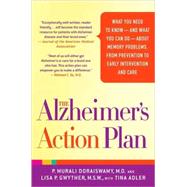
| Introduction | p. xv |
| Early and Accurate Diagnosis: How to Get It and Why It Matters | |
| Could It Be Alzheimer's? | p. 3 |
| What Looks Like Alzheimer's and Feels Like Alzheimer's But Isn't Alzheimer's | p. 21 |
| Why to Seek a Diagnosis Now | p. 38 |
| Where to Go-and How to Pay for It | p. 49 |
| Making the Most of the Doctor's Appointment | p. 59 |
| The Best Memory Tests | p. 72 |
| State-of the-Art Treatment | |
| The Truth About Alzheimer's Treatment | p. 103 |
| The Best Drugs to Treat Alzheimer's | p. 120 |
| Clinical Trials: Can You (Safely) Get Tomorrow's Treatments Today? | p. 139 |
| How Will We Treat Alzheimer's in the Future? | p. 164 |
| Yes, There Is Life After Diagnosis | |
| Heading Toward a New Normal: Living Well with Early-Stage Alzheimer's | p. 181 |
| The Middle Years: Finding Peace of Mind | p. 224 |
| When It's More Than Memory Loss | |
| Changes in Behavior and Emotional Well-Being | p. 279 |
| Medications for Depression, Anxiety, and Sleeplessness | p. 292 |
| Finding a Calm in the Storm: Medications to Treat the Worst Behavioral Symptoms | p. 314 |
| A Brain-Healthy Lifestyle | |
| What's Good for Your Heart Is Good for Your Brain: Diet, Exercise, and Supplements | p. 329 |
| Staying Connected: Keeping Your Brain Active | p. 362 |
| "Does Personality Change with Memory Loss?" and Other Frequently Asked Questions | |
| Our Top 40 Questions and Answers | p. 381 |
| Resources | p. 419 |
| Stages of Symptom Progression in Early Through Moderate Alzheimer's Disease | p. 435 |
| Sample Informed Consent Form (and How to Read Between the Lines) | p. 437 |
| Acknowledgments | p. 453 |
| Index | p. 455 |
| About the Authors | p. 471 |
| Table of Contents provided by Ingram. All Rights Reserved. |
The New copy of this book will include any supplemental materials advertised. Please check the title of the book to determine if it should include any access cards, study guides, lab manuals, CDs, etc.
The Used, Rental and eBook copies of this book are not guaranteed to include any supplemental materials. Typically, only the book itself is included. This is true even if the title states it includes any access cards, study guides, lab manuals, CDs, etc.